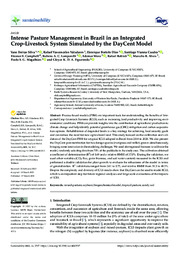Intense pasture management in Brazil in an integrated crop-livestock system simulated by the DayCent model.
Intense pasture management in Brazil in an integrated crop-livestock system simulated by the DayCent model.
Author(s): SILVA, Y. F.; VALADARES, R. V.; DIAS, H. B.; CUADRA, S. V.; CAMPBELL, E. E.; LAMPARELLI, R. A. C.; MORO, E.; BATTISTI, R.; ALVES, M. R.; MAGALHÃES, P. S. G.; FIGUEIREDO, G. K. D. A.
Summary: Abstract. Process-based models (PBM) are important tools for understanding the benefits of Integrated Crop-Livestock Systems (ICLS), such as increasing land productivity and improving environmental conditions. PBM can provide insights into the contribution of agricultural production to climate change and help identify potential greenhouse gas (GHG) mitigation and carbon sequestration options. Rehabilitation of degraded lands is a key strategy for achieving food security goals and can reduce the need for new agricultural land. This study focused on the calibration and validation of the DayCent PBM for a typical ICLS adopted in Brazil from 2018 to 2020. We also present the DayCent parametrization for two forage species (ruzigrass and millet) grown simultaneously, bringing some innovation in the modeling challenges. We used aboveground biomass to calibrate the model, randomly selecting data from 70% of the paddocks in the study area. The calibration obtained a coefficient of determination (R2) of 0.69 and a relative RMSE of 37.0%. During the validation, we used other variables (CO2 flux, grain biomass, and soil water content) measured in the ICLS and performed a double validation for plant growth to evaluate the robustness of the model in terms of generalization. R2 validations ranged from 0.61 to 0.73, and relative RMSE from 11.3 to 48.3%. Despite the complexity and diversity of ICLS results show that DayCent can be used to model ICLS, which is an important step for future regional analyses and large-scale evaluations of the impacts of ICLS.
Publication year: 2022
Types of publication: Journal article
Observation
Some of Embrapa's publications are published as ePub files. To read them, use or download one of the following free software options to your computer or mobile device. Android: Google Play Books; IOS: iBooks; Windows and Linux: Calibre.
Access other publications
Access the Agricultural Research Database (BDPA) to consult Embrapa's full library collection and records.
Visit Embrapa Bookstore to purchase books and other publications sold by Embrapa.

